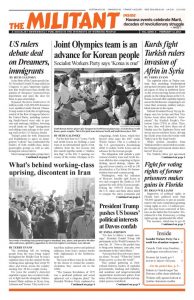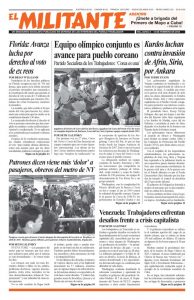February 12, 1993
As Washington’s occupation of southern Somalia nears the end of its second month, the U.S. military unleashed its firepower against forces loyal to ousted Somali dictator Mohamed Siad Barre that were threatening to seize control of the port city of Kismayo.
In the capital city of Mogadishu, where thousands of U.S. troops are deployed, shootings of Somalis have become virtually a daily occurrence as the U.S. military has begun actively organizing a new police force there.
With nearly 40,000 troops currently under U.S. command now in Somalia, UN and U.S. officials continue to discuss plans for replacing U.S. troops with a 20,000-strong UN force.
According to [UN] special envoy for Somalia Ismat Kittani, the new UN military force will probably be in Somalia for “not months but years.”
February 12, 1968
The massive National Liberation Front offensive against most of the occupied cities of South Vietnam opens a new stage of the Vietnamese revolution. The revolutionary forces demonstrated that they can challenge U.S. and Saigon armies for control of practically every square inch of the land.
The world’s mightiest imperialist power has been dealt a stunning blow. The blow is primarily political, although its immediate military impact is considerable. Those who are carrying it forward have written one of the most extraordinary and heroic pages in history.
The attack has already included “no less than 30 of South Vietnam’s 44 provincial capitals, as well as larger cities such as Saigon and Danang, American installations and uncounted towns,” according to the New York Times.
February 13, 1943
New demands for wage increases to equal rising living costs were voiced last week by a number of union bodies.
The growing pressure for wage raises is based on opposition to the administration wage policy embodied in the Little Steel formula of the War Labor Board, which bans increases of more than 15% over Jan. 1941 wage levels, although living costs have risen almost twice the 15% figure during this two-year period.
The United Mine Workers policy committee decided to request $2 a day wage increases for their 450,000 bituminous coal workers. It is expected that the union will ask for a similar raise for its 88,000 anthracite miners.
The head of the UMW policy committee pointed out that “an increase of 42% on the wholesale prices of articles essential to family maintenance cannot be ignored.”

